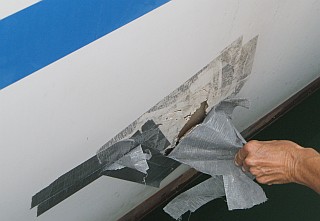
Duct tape covered Ocelot's hull while we sailed
Africa Road Trip #1
27 January 2008, Swaziland, Southern Africa
 Duct tape covered Ocelot's hull while we sailed |
Dear Friends and Family,
Gads! Two months since we last wrote - Time really does fly when you're having fun...
We landed safely in Richards Bay (KwaZulu-Natal, South Africa) at the end of November and almost immediately hosted a delightful Thanksgiving feast on Ocelot with many of the neighboring American boats. We soon moved Ocelot off the free concrete wall and into the Tuzi Gazi Marina where she's well protected, both from waves and dock-walking sightseers.
Examining our whale damage we had a pleasant surprise - We thought the wound in our hull had exposed the inner foam core, which would have required a complicated and extensive repair, but only the outer layer of resin-rich fiberglass was broken and the inner layer was still intact and protecting the foam core from moisture. Ocelot seems to be built even more robustly than we thought. Jon ground back the broken fiberglass to provide a good bonding surface and then had a professional fiberglass shop take a look. They pronounced everything sound and gave us a good price on doing the cosmetic repairs, which freed Jon up for other jobs. We also removed the damaged rudder and found that it was slightly more damaged than we had thought, but the fiberglass shop also pronounced it basically healthy and easy to repair, so they're doing that job now.
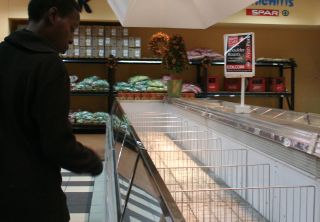 Empty shelves at a big grocery chain in Harare |
We looked at several cars - they're more expensive than we found in Australia. The crime problem here is also bad enough that there are very few station wagons, as people want the security and invisibility of a trunk (boot). We eventually settled on a 1991 Audi 500E sedan. Jon's father arrived from California and we had a very nice Christmas on Ocelot, followed by a huge yachty potluck on the deck of a local restaurant.
Jon's father grew up in Rhodesia (yes, the "old" Zimbabwe) so we headed north to look up old friends and a few remaining relatives. By tipping a friendly Customs official we were through the Beitbridge border post and into Zimbabwe in only an hour (across "the Great Grey-Green Greasy Limpopo River, all set about with Fever Trees" according to Rudyard Kipling).
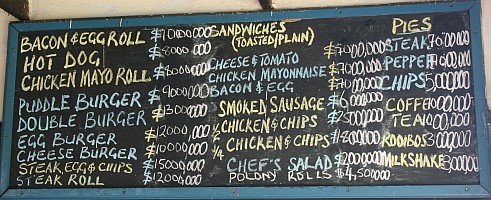 Prices in the millions (Zim $) leaves very little room on the menu. |
It really is criminal what President Robert Mugabe has done to Zimbabwe. By taking all the productive farms away and giving them to his cronies (because his popularity was declining) he has ruined a vibrant, productive economy in only a few short years. Zimbabwe used to export much of its produce, but now it can't even feed itself. Since the cronies don't know how to work the farms, they just stripped them and sold off what they could for a quick profit. Now the big productive farms have been reduced to a few "kitchen-gardens" generally tended only by the women. Immense fertile fields lie fallow, yet food is scarce. The men are largely out of work since there are no farms for them to work on. Inflation is well into 4 digits (8,000% per annum) and still climbing - doubling wages every month doesn't keep up. Stark empty shelves are the norm in supermarkets. Fuel is all but unobtainable. The black‑market exchange rate was about Z$2,200,000/US$ at that time but the largest bill available (released while we were there) was only Z$750,000, or about 35 cents. [3 months later the exchange jumped by a factor of 10 to about Z$25M/US$] We saw people carrying huge trunks of bills to the bank. Over 5 million Zimbabweans are said to have left the country, on foot, into South Africa and Zambia.
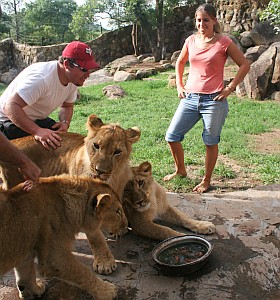 Amanda, cousin Graeme & cubs. |
Jon's cousins used to have a 10,000 hectare farm in Zimbabwe that had been in the family for generations. It had several dams for irrigation, a village for the workers, brick-kilns for the workers to build their houses, a free clinic, heavily subsidized food, and a school for the worker's children on a neighboring farm. But Libya's Maumar Kaddafi spoke on their land, and shortly after their farm was taken away at gun-point. Now the equipment has been sold so the farm can't be worked. The few workers left in the village eke out a subsistence living with small kitchen-gardens, but most of the land is basically not being used.
Still, Jon's cousins, now with jobs in Harare, were able to show us a fun time. We went out to a reservoir and game-park for New Years weekend, dancing the night away, meeting new friends, seeing many interesting new birds, and playing with 3 9‑month old lion cubs that out-weighed us! Driving around Harare was ... educational, in a sad sort of way. It's certainly not the bustling city it used to be. Power cuts have now affected the water supply so the city water is unfit to drink. There are some bad jokes about the situation, like:
|
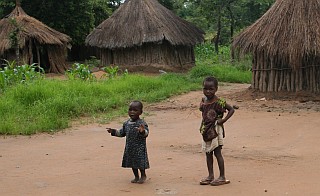 Children in a farm workers' village, Zambia |
We'd wanted to charter a houseboat on Lake Kariba (on the border with Zambia) but school holidays meant that none were available. So instead we drove north to Lusaka, the bustling capital of Zambia and spent 2 nights with more of Jon's cousins. Zambia is in much better shape than Zimbabwe, but much of southern Africa has been functioning without viable government support for years. Government, especially in emerging nations, is supposed to provide the infrastructure (roads, water, electricity, phones, schools, hospitals, etc.) so the people can get on with the business of growing the country. Southern African governments inherited a good infrastructure from the British, but generally haven't added to, or even maintained it, since they got it. The officials are much more interested in stuffing their pockets than serving the people. The roads are falling apart, the phone lines are cut down by the locals and sold to scrap merchants for their copper, power blackouts are common, and the quality of education is declining rapidly. The new South African regime hasn't been in power for as long, but already the signs are there, as power cuts (and corruption) are now common. The newly elected head of the African National Council, Jacob Zuma, has some 15 counts of corruption and rape pending against him. If he exerts executive power and has them all tossed out, South Africa will rapidly follow Zimbabwe, as Zuma thinks Mugabe is great. But then Zuma, previously a cattle herder with only a grade-school education, says that taking a shower is an effective prevention from AIDS. This from the head of a country with nuclear power. Stay tuned...
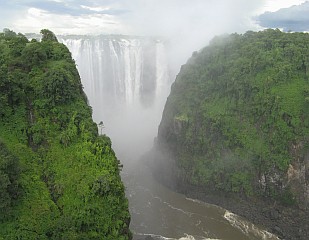 Victoria Falls from the Zambezi River Bridge |
From Lusaka we traveled southwest to Choma to stay on a big farm owned by friends of Jon's father. After Zimbabwe it was nice to see large prosperous farms, with lots of employees. Zambia, Mozambique and Tanzania are now leasing land cheaply if farmers will come farm it, but there's still lots of infrastructure missing. Pivot irrigation systems are considered cutting edge and very high-tech. Our friends have part ownership of a private game ranch, so we got to see our first (relatively) wild antelopes. Our hosts were most gracious and it was delightful staying on a prosperous farm and learning some of what it takes to keep it all running. Amanda had the company of other university-age friends and spent the days tubing a muddy river, playing a strange form of golf with swamps instead of water traps, and riding in the back of an open "bakkie" (pickup truck or ute) in torrential summer thunderstorms.
From Choma we continued southwest to the famous Victoria Falls - Mosi Oa Tunya, or "the smoke that thunders" - on the border between Zambia and the northwest corner of Zimbabwe. We had never been there in the wet season before and the volume of water was awesome, creating spray that was hard to distinguish from a rainstorm. We walked across the Victoria Falls Bridge (into Zimbabwe and back!) to stare into the swirling river abyss and watch a terrified young woman bungee jump into the chasm.
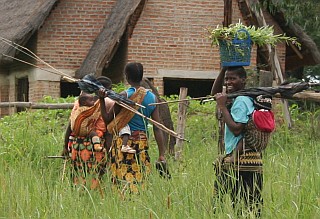 Three women, 3 children in from picking herbs |
From Zambia we crossed directly into Botswana on a rickety ferry across the Zambezi River at the tip of Namibia's Caprivi Strip. Botswana is an economic bright star in southern Africa, probably because they were never heavily colonized, never at war, and the people are largely one linguistic/ethnic group, the Batswana. What many westerners don't understand is that inter-tribal conflicts and hatreds are much more to blame for unrest and violence than racial conflicts between blacks and whites (although both South Africa and Zimbabwe are in backlash from years of colonialism). Rhodes et al didn't realize this when they marked out the country's borders. For instance, Zimbabwe encompasses both the Shona and Matabele tribes, which have hated each other for centuries. Mugabe slaughtered something like 25,000 Matabele once he got into power, but it didn't get much press as he was supposed to be "good" and taking over from the "bad" Ian Smith regime. We met several black Zimbabweans who now think they were much better off under Smith.
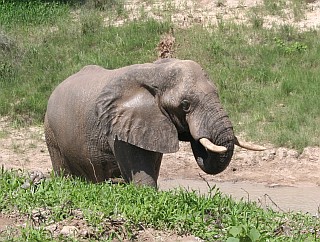 Right by the road in Botswana. Elephant bath. |
Botswana is largely desert (their money, pula, is also their word for rain) but it's an animal paradise. For instance, the Okavango River flows out of Angola and empties into the Kalahari desert in central Botswana, creating a huge shallow delta sprinkled with thousands of small islands - ideal for wildlife. In northeast Botswana lies Chobe National Park, which in the rainy season is impassable to all but 4X4 vehicles, so we took a boat trip on the Chobe River under the bluest skies we'd seen in 6 weeks. We had the whole boat to ourselves and our local guide had an excellent eye and was a fountain of information. Sue and Amanda logged and photographed about 30 new bird species and we saw lots of hippos, crocodiles, (hippodiles and crocopotomus) water‑buck, impala, and even elephant. Good fun!
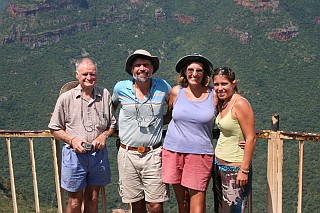 All smiles at Blyde River Canyon |
For our final few days with Jon's father, we crossed back into South Africa and headed to what used to be the eastern Transvaal - the "high veld" in the northeast part of the country. Driving the rim of Blyde River Canyon we had stunning views of waterfalls, the rocky escarpment itself, and down onto the lush "low veld" with vast vistas punctuated by the typically African flat-topped thorn trees. We stayed at delightful small backpacker lodges and had fun talking to the other travelers.
Our plans now are to drive to Capetown, fly back to Richards Bay, and sail Ocelot down to Capetown. That way we'll have a car when we get there. After touring around the Cape we plan to sell the car and cross the Atlantic to St. Helena, Brazil, and the Eastern Caribbean during March and April.
Fair winds and calm seas -- Jon, Sue and Amanda Hacking
Top Level: Home | Destinations | Cruising Info | Underwater | Boat Guests | Ocelot | Sue | Jon | Amanda | Chris | Site Map | Make a Comment
|
If our information is useful, you can help by making a donation |
Copyright © 2000‑ Contact: Jon and Sue Hacking -- HackingFamily.com, svOcelot.com. All rights reserved.